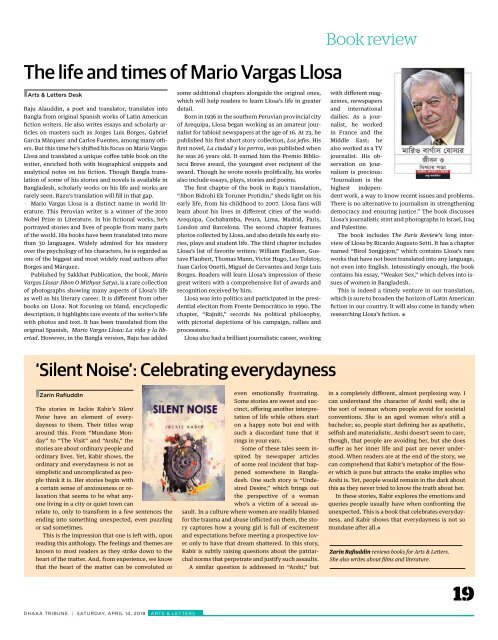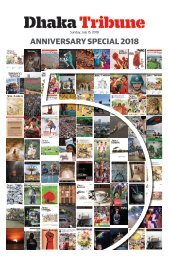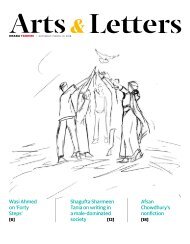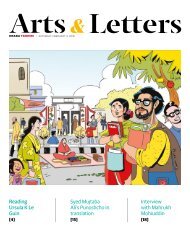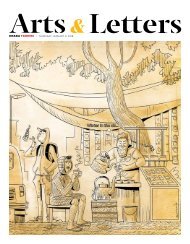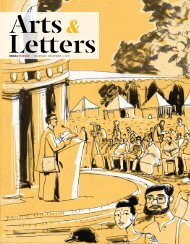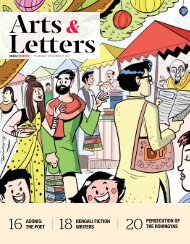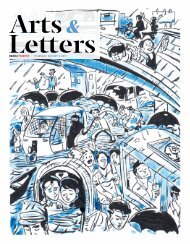Arts & Letters, April 2018
You also want an ePaper? Increase the reach of your titles
YUMPU automatically turns print PDFs into web optimized ePapers that Google loves.
The life and times of Mario Vargas Llosa<br />
Book review<br />
•<strong>Arts</strong> & <strong>Letters</strong> Desk<br />
Raju Alauddin, a poet and translator, translates into<br />
Bangla from original Spanish works of Latin American<br />
fiction writers. He also writes essays and scholarly articles<br />
on masters such as Jorges Luis Borges, Gabriel<br />
García Márquez and Carlos Fuentes, among many others.<br />
But this time he’s shifted his focus on Mario Vargas<br />
Llosa and translated a unique coffee table book on the<br />
writer, enriched both with biographical snippets and<br />
analytical notes on his fiction. Though Bangla translation<br />
of some of his stories and novels is available in<br />
Bangladesh, scholarly works on his life and works are<br />
rarely seen. Razu’s translation will fill in that gap.<br />
Mario Vargas Llosa is a distinct name in world literature.<br />
This Peruvian writer is a winner of the 2010<br />
Nobel Prize in Literature. In his fictional works, he’s<br />
portrayed stories and lives of people from many parts<br />
of the world. His books have been translated into more<br />
than 30 languages. Widely admired for his mastery<br />
over the psychology of his characters, he is regarded as<br />
one of the biggest and most widely read authors after<br />
Borges and Márquez.<br />
Published by Sakkhat Publication, the book, Mario<br />
Vargas Llosar Jibon O Mithyar Satya, is a rare collection<br />
of photographs showing many aspects of Llosa’s life<br />
as well as his literary career. It is different from other<br />
books on Llosa. Not focusing on bland, encyclopedic<br />
description, it highlights rare events of the writer’s life<br />
with photos and text. It has been translated from the<br />
original Spanish, Mario Vargas Llosa: La vida y la libertad.<br />
However, in the Bangla version, Raju has added<br />
some additional chapters alongside the original ones,<br />
which will help readers to learn Llosa’s life in greater<br />
detail.<br />
Born in 1936 in the southern Peruvian provincial city<br />
of Arequipa, Llosa began working as an amateur journalist<br />
for tabloid newspapers at the age of 16. At 23, he<br />
published his first short story collection, Los jefes. His<br />
first novel, La ciudad y los perros, was published when<br />
he was 26 years old. It earned him the Premio Biblioteca<br />
Breve award, the youngest ever recipient of the<br />
award. Though he wrote novels prolifically, his works<br />
also include essays, plays, stories and poems.<br />
The first chapter of the book in Raju’s translation,<br />
“Jibon Bidrohi Ek Toruner Protidin,” sheds light on his<br />
early life, from his childhood to 2007. Llosa fans will<br />
learn about his lives in different cities of the world:<br />
Arequipa, Cochabamba, Peura, Lima, Madrid, Paris,<br />
London and Barcelona. The second chapter features<br />
photos collected by Llosa, and also details his early stories,<br />
plays and student life. The third chapter includes<br />
Llosa’s list of favorite writers: William Faulkner, Gustave<br />
Flaubert, Thomas Mann, Victor Hugo, Leo Tolstoy,<br />
Juan Carlos Onetti, Miguel de Cervantes and Jorge Luis<br />
Borges. Readers will learn Llosa’s impression of these<br />
great writers with a comprehensive list of awards and<br />
recognition received by him.<br />
Llosa was into politics and participated in the presidential<br />
election from Frente Democrático in 1990. The<br />
chapter, “Rajniti,” records his political philosophy,<br />
with pictorial depictions of his campaign, rallies and<br />
processions.<br />
Llosa also had a brilliant journalistic career, working<br />
with different magazines,<br />
newspapers<br />
and international<br />
dailies. As a journalist,<br />
he worked<br />
in France and the<br />
Middle East; he<br />
also worked as a TV<br />
journalist. His observation<br />
on journalism<br />
is precious:<br />
“Journalism is the<br />
highest independent<br />
work, a way to know recent issues and problems.<br />
There is no alternative to journalism in strengthening<br />
democracy and ensuring justice.” The book discusses<br />
Llosa’s journalistic stint and photographs in Israel, Iraq<br />
and Palestine.<br />
The book includes The Paris Review’s long interview<br />
of Llosa by Ricardo Augusto Setti. It has a chapter<br />
named “Birol Songjojon,” which contains Llosa’s rare<br />
works that have not been translated into any language,<br />
not even into English. Interestingly enough, the book<br />
contains his essay, “Weaker Sex,” which delves into issues<br />
of women in Bangladesh.<br />
This is indeed a timely venture in our translation,<br />
which is sure to broaden the horizon of Latin American<br />
fiction in our country. It will also come in handy when<br />
researching Llosa’s fiction. •<br />
‘Silent Noise’: Celebrating everydayness<br />
•Zarin Rafiuddin<br />
The stories in Jackie Kabir’s Silent<br />
Noise have an element of everydayness<br />
to them. Their titles wrap<br />
around this. From “Mundane Monday”<br />
to “The Visit” and “Arshi,” the<br />
stories are about ordinary people and<br />
ordinary lives. Yet, Kabir shows, the<br />
ordinary and everydayness is not as<br />
simplistic and uncomplicated as people<br />
think it is. Her stories begin with<br />
a certain sense of anxiousness or relaxation<br />
that seems to be what anyone<br />
living in a city or quiet town can<br />
relate to, only to transform in a few sentences the<br />
ending into something unexpected, even puzzling<br />
or sad sometimes.<br />
This is the impression that one is left with, upon<br />
reading this anthology. The feelings and themes are<br />
known to most readers as they strike down to the<br />
heart of the matter. And, from experience, we know<br />
that the heart of the matter can be convoluted or<br />
even emotionally frustrating.<br />
Some stories are sweet and succinct,<br />
offering another interpretation<br />
of life while others start<br />
on a happy note but end with<br />
such a discordant tune that it<br />
rings in your ears.<br />
Some of these tales seem inspired<br />
by newspaper articles<br />
of some real incident that happened<br />
somewhere in Bangladesh.<br />
One such story is “Undesired<br />
Desire,” which brings out<br />
the perspective of a woman<br />
who’s a victim of a sexual assault.<br />
In a culture where women are readily blamed<br />
for the trauma and abuse inflicted on them, the story<br />
captures how a young girl is full of excitement<br />
and expectations before meeting a prospective lover<br />
only to have that dream shattered. In this story,<br />
Kabir is subtly raising questions about the patriarchal<br />
norms that perpetrate and justify such assaults.<br />
A similar question is addressed in “Arshi,” but<br />
in a completely different, almost perplexing way. I<br />
can understand the character of Arshi well; she is<br />
the sort of woman whom people avoid for societal<br />
conventions. She is an aged woman who's still a<br />
bachelor; so, people start defining her as apathetic,<br />
selfish and materialistic. Arshi doesn’t seem to care,<br />
though, that people are avoiding her, but she does<br />
suffer as her inner life and past are never understood.<br />
When readers are at the end of the story, we<br />
can comprehend that Kabir’s metaphor of the flower<br />
which is pure but attracts the snake implies who<br />
Arshi is. Yet, people would remain in the dark about<br />
this as they never tried to know the truth about her.<br />
In these stories, Kabir explores the emotions and<br />
queries people usually have when confronting the<br />
unexpected. This is a book that celebrates everydayness,<br />
and Kabir shows that everydayness is not so<br />
mundane after all.•<br />
Zarin Rafiuddin reviews books for <strong>Arts</strong> & <strong>Letters</strong>.<br />
She also writes about films and literature.<br />
19<br />
DHAKA TRIBUNE | SATURDAY, APRIL 14, <strong>2018</strong> ARTS & LETTERS


